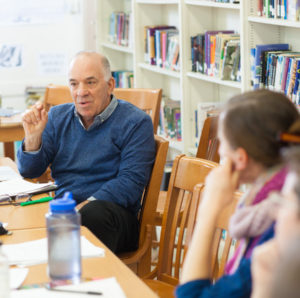This mini course provides the essential ideas behind the role of the final commentator. Explore experiences to develop your own practice as a final commentator.

“When I was a novice teacher, I observed research lessons with experienced teachers. I worked so hard to observe the lessons carefully, but when experienced teachers shared their observations during the post-lesson discussions, I was always shocked. I had been in the same classroom, at the same time, with the same conditions. But how much those educators could see! I had never realized. It’s so important to develop one’s eye and hone the power of observation.”
— Dr. Akihiko Takahashi
Associate Professor of Elementary Mathematics, DePaul University, Chicago, IL
Good Final Commentators
- Are keen observers of instruction and highly knowledgeable about the subject matter.
- Have a track record of improving their own teaching and supporting the improvement of colleagues.
- Take a learning stance, noting what they have learned from the plan and instruction.
- Grasp what teachers want for students, and help them work toward it.
- Ideally, have firsthand experience as a research lesson instructor.
Presenting the Commentary
- Thank the instructor and team. Begin with appreciations to the instructor and team, noting that their willingness to open up their classroom teaching build the education profession.
- Start with lesson strengths. Share one or more strengths of the lesson. Note what you learned from the lesson plan and instruction.
- Dive deeper. After sharing a few positive learnings, dive deeper into the content area, observations of students, the lesson design, or another entry point that is key, given your observations.
- Target growth. Understanding the team’s aspirations —and giving a purposeful and reachable next step—is what distinguishes great commentary. What will help this team grow? Ideally, team members should feel they have learned something important from your commentary, and should be eager to act on what they’ve learned and to continue lesson study.
- Thank the instructor, team, and observers again. Express gratitude for the learning made possible by the instructor and team, who generously opened up their practice.
Goals of the Final Comments
Effective final comments:
- show the connection between theory and practice
- help teachers to learn how to reflect on teaching and learning
- include ideas and concrete examples to support the school and teachers advance the school’s research
- highlight the joy of collaborative study and of making the school a place for the staff to work together on the research theme
(from Dr. Akihiko Takahashi’s presentation on 10/30/2015, reproduced with permission.)
Recommended reading:
Takahashi, A. (2013). The Role of the Knowledgeable Other in Lesson Study: Examining the Final Comments of Experienced Lesson Study Practitioners. Mathematics Teacher Education and Development, October 2013.
